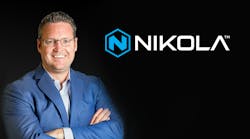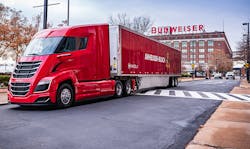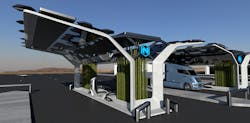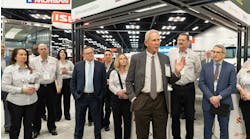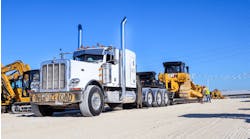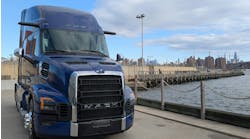Following the successful merger vote by VectoIQ shareholders, Nikola Corp. will officially be a publicly traded company (as of June 4) on the NASDAQ stock market as NKLA, replacing VectoIQ’s VTIQ. For six years, the upstart trucking OEM out of Phoenix has amassed the necessary capital, engineering knowhow and partner base to become the first manufacturer to mass produce heavy-duty zero-emissions trucks and the charging infrastructure to power them. This includes battery-electric vehicles (BEVs) and hydrogen fuel cell electric trucks (FCET).
Aside from the trucks’ capabilities, which promise ranges in excess of 700 miles while producing zero emissions, the most disruptive achievement is how the total cost of ownership is bundled into the cost. Customers will lease the vehicles through third-party financial services and pay an expected $1 per mile, CEO Trevor Milton said.
In the next year, the Nikola Tre battery-electric cabover will roll off German assembly lines, and the sleeper and daycab models, the Nikola One and Two, are expected to follow in 2023. The Nikola Badger pickup, which also will be offered with a BEV or FCET powertrain, is also on the way. Norwegian partner NEL Hydrogen will provide the electrolyzer tech and fueling equipment to process hydrogen at the charging stations.
By 2028, Nikola plans to produce tens of thousands of trucks and hundreds of charging stations and dealers to support the Nikola CEO’s vision of a zero-emissions juggernaut. There are currently 14,000 pre-orders. Anheuser Busch, which has already conducted a successful beer delivery with a Nikola truck, ordered 800 FCETs for its fleet and will install Nikola fueling stations along its routes.
Analysts have predicted Nikola, now valued at $11 billion, could reach $50 billion or more.
With no trucks in fleet hands yet, all of the above expectations don’t amount to much … yet. But the promises Milton, who founded the company in 2014, has made so far have been pretty much on the money. The 38-year-old college dropout turned billionaire may not be self-made, as he borrowed $20 from his dad to start his first candy-selling school enterprise, but he is self-aware. He actually embraces skepticism and looks forward to proving skeptics wrong while cleaning up the transportation sector's emissions output.
So for now, understanding the leader’s values and vision may be the best way to judge if Nikola is in it for the long haul or will be a short-lived trucking tale. FleetOwner spoke with Milton on May 31 about the merger, the company, and what the future holds.
This interview was edited for clarity and length.
FleetOwner: What are the biggest impacts your partners and customers will see once the merger is complete and the teams are integrated?
Trevor Milton: We're going to focus on two things. One is getting the factory in Ulm, Germany, spitting trucks out. That happens within 12 months. That’s the first of full-production, all-electric, zero-emissions semi-truck assembly line in the world. Number two is building out hydrogen stations at the same time. We're working with Anheuser-Busch on those locations. We’re getting ready to announce where those are going.
Once those two things are done, this company’s value, in my opinion, has almost no ceiling because the entire business model is completely proven out, and then it is all just massive capital to great profitability.
FO: What are the advantages of owning the charging stations versus other models where fleets work with various energy providers to install them?
TM: Nikola was in charge of all the heavy-duty protocols and we’re the head of an industry group for all heavy duty fueling. So that means not only do we design all the protocols, but we're sharing them with the world.
The biggest problem other people have is their vehicles just don't work on other people's networks that well. And they're slow, they're not optimized, they can't control it. Other people own it. With Nikola the entire supply chain is completely owned by us, which is really important because we control not only the truck but all the energy the truck uses as well.
FO: What are some challenges with going public?
TM: You’re held to a different level of scrutiny. Everyone's filing through everything you ever do. That's a little more difficult knowing that every single thing you ever do is going to be criticized or promoted.
It also comes with good things. People can trust you. The biggest problem that we've had up to this point is a lot of investors were terrified that we're going public would uncover all our books, all our numbers, all our supply. Then they get a sense of comfort because they know we’re not a fraud. And that's been the biggest thing for us is making sure that we're as transparent as we can be.
As of today, our company is worth over $10 billion. It's one of the greatest success stories in American history. We're changing emissions worldwide. Now you got a target on your back, everyone wants to take you down. Everyone wants to short you, so you're just going to get hit by everybody nonstop. The key is to stay very, very positive through all of it and help educate the investors not to worry about day traders and short sellers.
FO: Do you think your faith has helped you stay on that positive track and take on these new trials?
TM: One hundred percent. Everyone knows I'm a very faith-oriented CEO. I believe in talking about how faith affects your life for everything — not just yourself, but your business, your health, your family.
You have to learn how to deal with the negative, fix the problem quick and then focus on the positive so you can solve a problem, even a bad one, really quickly. And then you focus on all the positives that come with it. It seems like the universe rewards you for that.
When you dwell on the good, your body, your mind, and your soul and your spirit are able to stay healthy and happy. The key to running a big company is being healthy.
FO: Can you explain in simple terms how the Nikola leasing system works?
TM: Because we own the network and the fuel, when someone leases a truck from us, they just pay us about $1 a mile for everything. That means the truck, the service, the warranty, the maintenance, all of it.
Right now, freight is around $1.20 to $2.20 a mile. Well, that means somebody's going make 80 cents to $1.20 a mile driving our truck. No one makes that kind of money out there in this market. We take out all the uncertainty and volatility, and take in all the complexity and back office needs that a driver would normally have.
By simplifying all that, Nikola trucks can be up to 20 to 30% less than diesel, and that's never been done before.
FO: What about maintenance?
TM: We're going to be signing with dealership networks all over the country. No matter where they are throughout the country, you will have full coverage in both the U.S. and Canada. Customers never have to worry about calling anybody. It's all done through our digital screen. If they have a tire blowout, our system already knows it and sends alerts to the network. A repair truck is already on the way before the driver even pulls over and will tell the customer the service truck’s GPS location and estimated time of arrival.
FO: How is that economically feasible?
TM: Other truck OEMs sell their trucks for $150,000 and then the oil company gets $750,000 in revenue. We took all that money from the oil company and dedicate just a few thousand dollars per truck to on-demand, ready-to-go, instantaneous technicians at every one of our locations. We're now able to afford offering solutions that no one in the world has ever dreamed of.
FO: You said once NKLA goes up on the Nasdaq, you have fulfilled another one of your dreams. What’s the next professional dream you want realized?
TM: My entire dream now is to actually execute on what I promised. And that's what I'm focused on for the next 10 years. After that, I'll probably be done, to be honest. I have no desire to go to war again. I've already been to war many times in my life, as this is my fifth company. I got wounds all over my body.
My sole goal in life after that would be to just give instruction to the younger group that is coming up and willing to go to battle and teach them how not to make the mistakes that I've made in my life.
FO: As a kid, your first business was selling candy to your friends in school, and then you got in trouble with the principal. Have you gone back to see that principal now that you’re a billionaire?
TM: I was buying Almond Joy and KitKat candy bars 20 for $1 at AMPM [convenience stores], using $20 I got from my dad. I’d sell them at school, and I’d make a killing on it. Occasionally when I'm in Vegas, I'll go back to my childhood house, and I'll drive by it. And I'll go to the school.
I'm not one to ever get emotional, but whenever I walk through that school ground, almost every time I'll end up crying pretty hard. My mother died when I was 14, and every memory I had of that elementary school had to do with her. So I would get really emotional. I don't even remember the principal’s name, but I do know that when I got caught, my dad and my mother were there telling him, “You cannot punish a kid for this. It’s why he’s going to school. If you want to redirect it to someone else, give him a new challenge. Don't tell him he did wrong.” And that was the day that I learned my dad was going to be my best friend. So for that, I'm eternally grateful for that guy.
